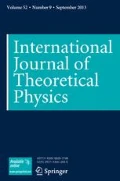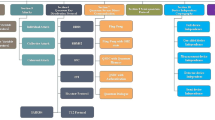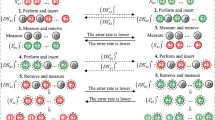Abstract
Two-party quantum computation (2PQC) allows two participants Alice and Bob to securely compute a given unitary function on their quantum inputs without leaking privacy. Existing 2PQC protocols require participants to have strong quantum capability, such as preparing qubits and performing measurements. Recently, Kashefi et al. proposed a 2PQC protocol named QYao protocol, where Alice only has to prepare qubits and perform Pauli operations, but Bob needs to have a powerful quantum computer. In this paper, we simplify the QYao protocol and reduce Bob’s quantum capability by applying blind quantum computing (BQC) in 2PQC. Two improved 2PQC protocols are proposed. The first protocol allows Bob to generate his encrypted input by making measurements and thus removes encryption at the input stage. The second protocol improves the verification capability of Bob based on the method of stabilizer testing and further reduces Bob’s ability to make measurements only. Besides, Alice can be more flexible since it is enough for her to produce an appropriate graph state instead of a fixed dotted triple-graph resource state DT(G). After the computation, two parties’ inputs also can be kept secret in both presented protocols.




Similar content being viewed by others
References
Yao, A.C.: Protocols for secure computations. In: Proceedings of the 23rd Annual Symposium on Foundations of Computer Science, pp 160–164. IEEE (1982)
Goldreich, O., Micali, S., Wigderson, A.: How to play any mental game. In: Proceedings of the 19th Annual ACM Symposium on Theory of Computing, pp. 218–229. ACM (1987)
Yao, A.C.: Security of quantum protocols against coherent measurements. In: Proceedings of the 27th Annual ACM Symposium on Theory of Computing, pp. 67–75. ACM (1995)
Yao, A.C.: How to generate and exchange secrets. In: Proceedings of the 27th Annual Symposium on Foundations of Computer Science, pp. 162–167. IEEE (1986)
Kashefi, E., Wallden, P.: Garbled quantum computation. Cryptography 12, 6–35 (2017)
Dupuis, F., Nielsen, J.B., Salvail, L.: Secure two-party quantum evaluation of unitaries against specious adversaries. In: Proceedings of CRYPTO 2010, LNCS, vol. 6223, pp 685–706 (2010)
Sun, Z., Li, Q., Yu, F., Chan, W.H.: Application of blind quantum computation to two-party quantum computation. Int. J. Theor. Phys. 57, 1864–1871 (2018)
Liu, W.J., Xu, Y., Yang, C.N., Yu, W.B., Chi, L.H.: Privacy-preserving quantum two-party geometric intersection. Computers, Materials & Continua 60, 1237–1250 (2019)
Childs, A.M.: Secure assisted quantum computation. Quantum Information Computation 5, 456–466 (2005)
Broadbent, A., Fitzsimons, J., Kashefi, E.: Universal blind quantum computation. In: Proceedings of the 50th Annual IEEE symposium on foundations of computer science, pp. 517–526. IEEE (2009)
Morimae, T., Fujii, K.: Blind quantum computation protocol in which Alice only makes measurements. Phys. Rev. A 87, 3393–3402 (2012)
Sheng, Y.B., Zhou, L.: Deterministic entanglement distillation for secure double-server blind quantum computation. Sci. Rep. 5, 7815 (2015)
Li, Q., Chan, W.H., Wu, C.H., Wen, Z.H.: Triple-server blind quantum computation using entanglement swapping. Phys. Rev. A 89, 040302 (2014)
Li, Q., Li, Z., Chan, W.H., Zhang, S., Liu, C.: Blind quantum computation with identity authentication. Phys. Lett. A 382, 938–941 (2018)
Sheng, Y.B., Zhou, L.: Blind quantum computation with a noise channel. Phys. Rev. A 98, 052343 (2018)
Fitzsimons, J.F., Kashefi, E.: Unconditionally verifiable blind quantum computation. Phys. Rev. A 96, 012303 (2017)
Morimae, T.: Verification for measurement-only blind quantum computing. Phys. Rev. A 89, 060302 (2014)
Hayashi, M., Morimae, T.: Verifiable measurement-only blind quantum computing with stabilizer testing. Phys. Rev. Lett. 115, 220502 (2015)
Takeuchi, Y., Mantri, A., Morimae, T., Mizutani, A., Fitzsimons, J.F.: Resource-efficient verification of quantum computing using Serfling’s bound. npj Quantum Information 5, 27 (2019)
Morimae, T., Nagajg, D., Schuch, N.: Quantum proofs can be verified using only single qubit measurements. Phys. Rev. A 93, 022326 (2016)
Takeuchi, Y., Morimae, T.: Verification of many-qubit states. Physical Review X 8, 021060 (2018)
Broadbent, A.: How to verify a quantum computation. Theory of Computing 14, 1–37 (2018)
Urmila, M.: Classical verification of quantum computations. arXiv:1804.01082 (2018)
Gheorghiu, A., Hoban, M.J., Kashefi, E.: A simple protocol for fault tolerant verification of quantum computation. arXiv:1804.06105 (2018)
Acknowledgements
This work was supported by the Joint Funds of the National Natural Science Foundation of China and China General Technology Research Institute (Grant No. U1736113), Hunan Provincial Natural Science Foundation of China (Grant No.2018JJ2403), and Hunan province science and technology project funds (Grant No. 2018TP1036). Z. Sun is supported by the Science and Technology Innovation Projects of Shenzhen (Grant No.JCYJ20170818140234295) and S. Shen is supported by the Research Foundation of Education Bureau of Hunan Province (Grant No. 17C1538).
Author information
Authors and Affiliations
Corresponding author
Additional information
Publisher’s Note
Springer Nature remains neutral with regard to jurisdictional claims in published maps and institutional affiliations.
Rights and permissions
About this article
Cite this article
Zhu, Y., Li, Q., Liu, C. et al. Secure Two-Party Computation Based on Blind Quantum Computation. Int J Theor Phys 59, 2074–2082 (2020). https://doi.org/10.1007/s10773-020-04479-0
Received:
Accepted:
Published:
Issue Date:
DOI: https://doi.org/10.1007/s10773-020-04479-0




